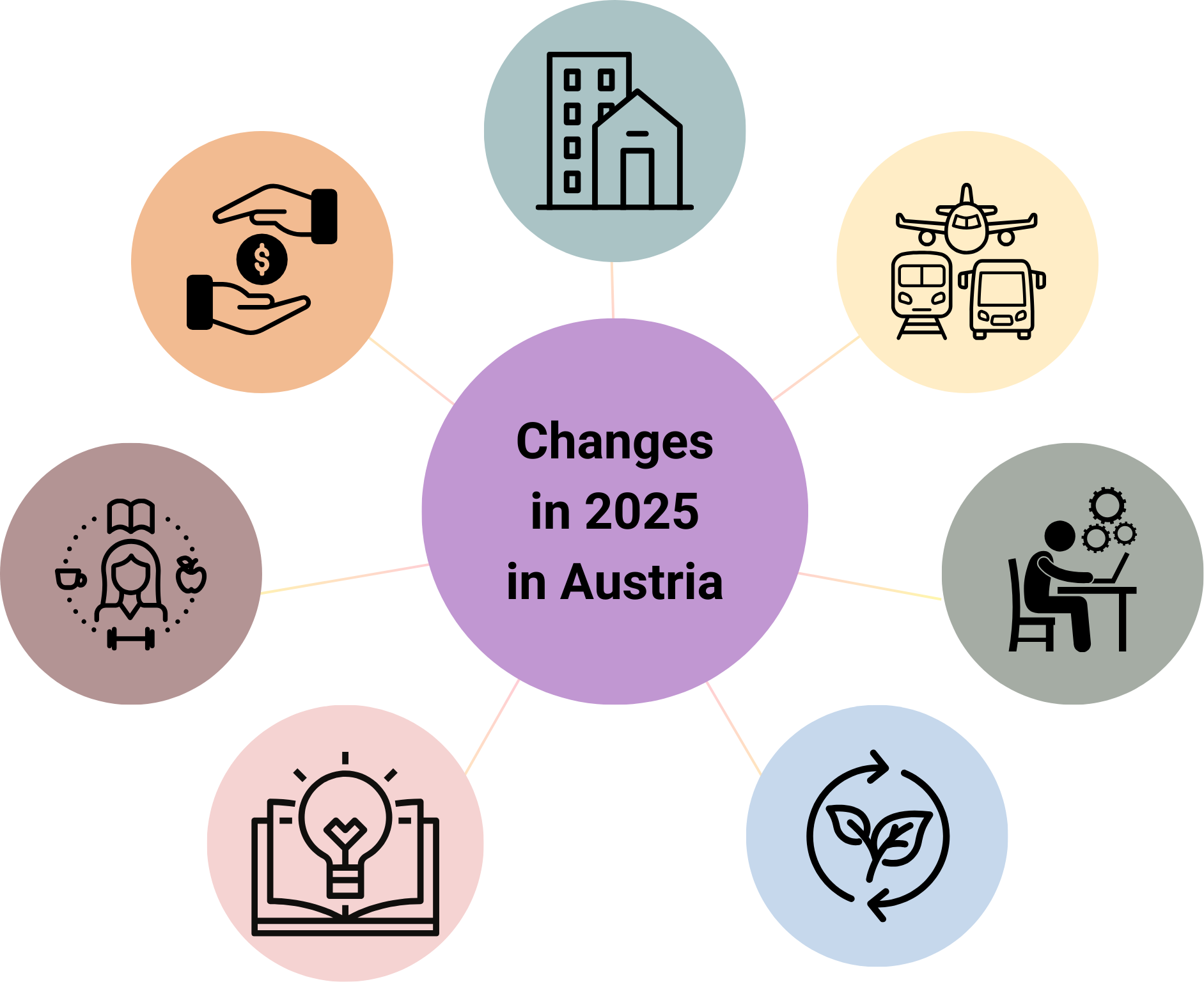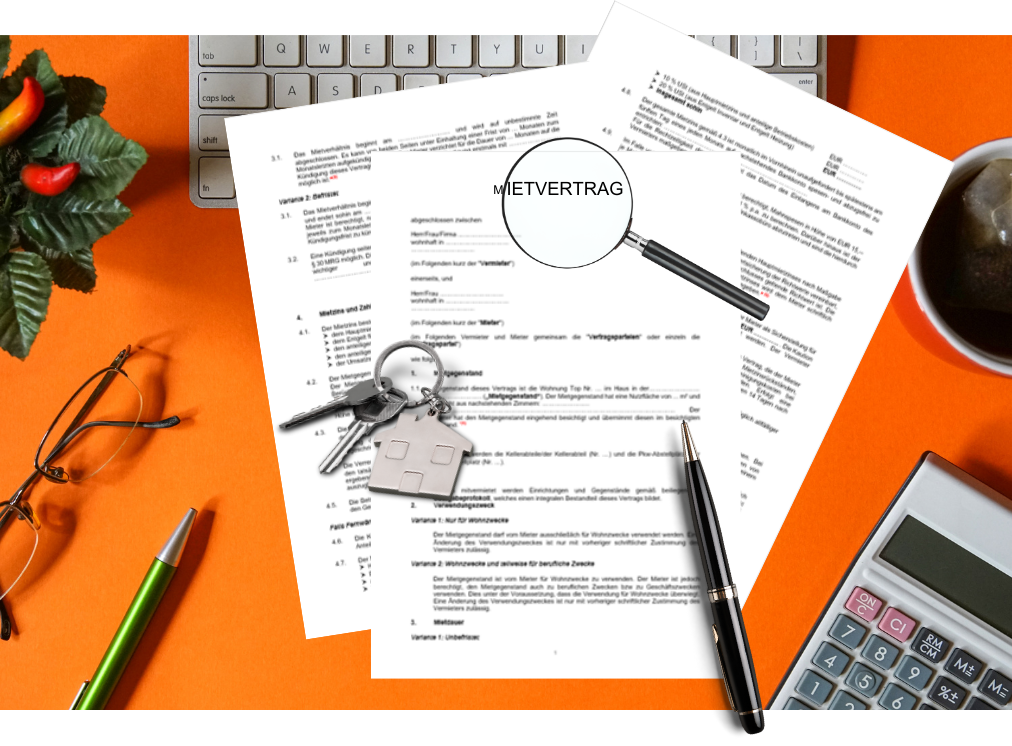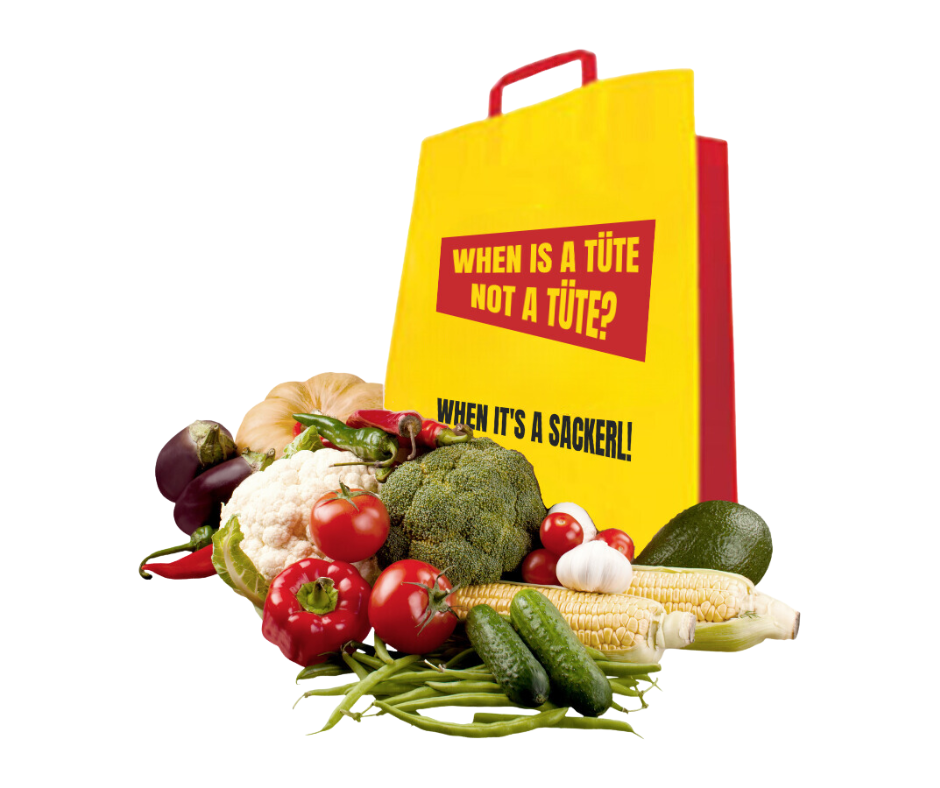What Changes are Happening in Austria in 2025
2025 brings a wave of changes to Austria that could impact daily life, from new regulations to shifts in costs and services. Whether you are considering a move to Austria or you already call it home, understanding these changes is key to staying informed. In this post, we will explore what is ahead, from adjustments in energy pricing to new travel opportunities and beyond.
 Financial and Economic
Financial and Economic
Updated Tax Brackets
Income tax brackets have been adjusted to align with inflation, reflecting Austria's commitment to mitigating the impact of rising costs on taxpayers. The brackets have been adjusted upward slightly compared to 2024 to match inflation, ensuring that people keep more of their income within lower tax rates. Below is a table displaying the new tax brackets for 2025, compared to 2024, to show the adjustment. You can use this calculator by the Ministry of Finance to calculate your personal relief.The new inflation-adjusted tariff brackets for 2025
| Tax bracket | From 1st January 2025 (in Euros) |
2024 (in Euros) |
| Tax-free | to 13,308 | to 12,816 |
| 20% | 13,308 to 21,617 | 12,816 to 20,818 |
| 30% | 21,617 to 35,836 | 20,818 to 34,513 |
| 40% | 35,836 to 69,166 | 34,513 to 66,612 |
| 48% | 69,166 to 103,072 | 66,612 to 99,266 |
| 50% | 103,072 to 1,000,000 | 99,266 to 1,000,000 |
| 55% | Above 1,000,000 | Above 1,000,000 |
Salary Increases
Thanks to collective bargaining, many employees in Austria will see salary increases in 2025, with raises in line with or above inflation, up to 13% across various industries, including IT, healthcare, hospitality, education, metal, paper, shipping, and postal sectors. These adjustments aim to keep pace with, or exceed inflation. Find out more about industry-specific salary changes here.
Tax Deductions:
- Single-earners (Alleinverdienerabsetzbetrag: households where only one person is earning income) and single parents (Alleinerzieherabsetzbetrag) increased by 4.9%: €601 for one child; €813 for two children; and €1,080 for three children. For each additional child, €268 are added.
- Pensioner (Pensionistenabsetzbetrag: pensioners whose annual taxable income does not exceed a maximum amount of €30,957 in 2025): €1,002 (previously €954), with the higher amount rising to €1,476 (previously €1,406).
- Commuters: Transport Deduction (Verkehrsabsetzbetrag) increased to €487 (previously €463).
Social Benefits
Family Allowances (Familienbeihilfe ) and Child Tax Credit (Kindermehrbetrag): Family allowance has risen by 4.6%, ranging from €138.40 to €200.40 per month (depending on the child's age). The child tax credit now stands at €70.90 per month (previously €67.80). From July, single parents earning up to €25,725 annually will receive a new €60 monthly child supplement (Kinderzuschuss).
Parents with multiple children will also benefit from an updated sibling scale (Geschwisterstaffel), which adds further payments for each additional child.
Student Income Limits: Students can now earn up to €15,000 annually without losing family allowance benefits, increasing their financial independence.
Pensions: Pensions have increased by 4.6%, with minimum pensions around €1,275 per month. Pensions above €6,060 per month rise by a capped amount of €278.76. Additional support includes an increased supplementary income exemption of €551.10 per month, as well as a rise in the annual contribution exemption to €1,355.
Plus, for those retiring this year, additional benefits of extended pension protection, where pensions are adjusted to reflect recent wage and salary increases; and suspension of the aliquotation rule, meaning pensioners won't have benefits reduced due to certain factors for greater financial stability.
Care Allowance (Pflegegeld): Care allowances have risen by 4.6%, with monthly amounts ranging from €200.80 to €2,156.60.
Small Business Regulations
Austria's VAT reform is a game changer for small businesses and freelancers. Higher turnover limits, simplified rules, and extended benefits for EU-based companies make it easier for small companies to grow. The changes reduce administrative burdens, streamline compliance and improve cross-border trade, giving smaller enterprises more flexibility.
| 2025 | 2024 | |
| VAT threshold | €55,000 (gross) | £35,000 (net) - corresponding to €42,000 (gross), based on assumed tax of 20% |
| Flexibility to exceed VAT threshold while retaining VAT exemption | By up to 10% per year. If 10% threshold is exceeded, the business must charge VAT only on the amount above the threshold. | By up to 15% once every five years without losing their VAT exemption |
| EU-based small businesses, not in Austria | Earning under €100,000 annually can apply for Austrian VAT exemptions | Unable to apply for Austrian VAT exemptions |
Real-Time Bank Transfers
From 9th January 2025, EU banks have enabled real-time transfers for receiving money, and by October, sending transfers will also be instantaneous, completing within ten seconds, speeding up financial transactions for businesses and individuals.
 Housing and Real Estate
Housing and Real Estate
Renting
Rental prices in Austria are set to rise in 2025, driven by high demand and limited supply. Vienna, for example, surpassed two million residents last year, adding pressure to the market. At the same time, lease terminations remain low due to tight rental conditions, while a sharp decline in new housing projects is further restricting supply. Property consultants EHL report that only 4,200 new rental apartments were completed in Austria in 2024 - a 25% drop from the previous year. The outlook for 2025 is even tighter, with just 1,800 new rental units expected, further driving up rents.
A recent study by ImmoScout24 found that rental prices increased in nearly all Austrian provinces between January and November 2024. In Vienna, demand for rental apartments surged by 29%, with districts like Floridsdorf (+63%) and Ottakring (+62%) seeing the sharpest price hikes. Overall, renters in Vienna experienced an average rent increase of 11%, reaching €19.20 per square metre. For tenants in unregulated private rentals, prices are expected to continue rising.
Following a rent freeze in 2024, regulated rents under the Tenancy Act - including Richtwertmieten (guide value rents) and Kategoriemieten (category rents) for older buildings - will increase again from 1st April 2025. This adjustment will be capped at 5%, based on the average inflation rate for 2024.
Buying property
KIM Regulation: Austria’s strict lending rules, designed to reduce risky borrowing, are set to expire in June 2025. The regulation required buyers to provide at least 20% equity and capped loan terms at 35 years - posing challenges for middle-income earners and young families trying to enter the property market. With its expiry, lending conditions are expected to ease, making homeownership more accessible. This shift could boost property purchases and encourage more residential construction.
Lower Interest Rates: After years of increases, interest rates are starting to decline. The European Central Bank has gradually lowered rates, with ten-year mortgage rates now at around 3.2%, down from 3.6% a year ago. While still higher than the really low rates of previous years, this drop could save buyers hundreds of euros each month, making home financing more affordable.
 Working Policies
Working Policies
Mileage Allowance: Allowances have improved to promote sustainable commuting:
The official mileage allowance will be €0.50 per kilometre, regardless of whether a car, a motorcycle or a bicycle is used.
- Increased to €0.50 per kilometre for drivers (previously €0.42); with an additional allowance for car pooling - an additional €0.15 per passenger (previously €0.05);
- Bike allowance has doubled to 3,000 km annually; and
- The lower limit for commuters on foot will be halved to one kilometre.
Remote working: Austria’s new Teleworking Act allows employees to work from various locations, such as co-working spaces, cafés, or relatives' homes, provided they have an agreement with their employer. While this law provides more flexibility, critics argue that accident insurance coverage for teleworking arrangements remains insufficient.
 Environment and Energy
Environment and Energy
Utilities Price Increases: Electricity prices are up by 20%, and gas prices have risen similarly. These increases are attributed to: the cost of maintaining and upgrading the electricity grid; significant investments in the grid to support renewable energy expansion; lower energy consumption through the grid as more households adopt self-sufficient systems like solar panels; and expiration of subsidies such as the electricity price cap (which capped the first 2,900 kWh to €0.10 cents per kWh) and other measures (reduced electricity levy and green energy subsidies) expiring on 1st January, all leading to higher prices.
Subsidies and Support: Subsidies for heat replacement, photovoltaics, and e-vehicles continue until May 2025 or until funds are exhausted. Maximum grants include:
- Heat replacement: Up to €7,500;
- Photovoltaics: Up to €2,000;
- E-vehicles: €5,000.
Single-Use Deposit System: A nationwide deposit system for bottles and cans will add a €0.25 deposit per container, to encourage recycling. Consumers will see a return when deposits are redeemed.
Smartphone Durability Rules: New EU rules mandate easily replaceable parts for at least seven years and software updates for 5 years. Reducing e-waste and extending device lifespans saves consumers money in the long-term.
 Transportation and Travel
Transportation and Travel
Public Transport
Underground (U-Bahn): Vienna’s U2 line is fully operational, with extensions to major residential areas. Rathaus, Volkstheater, Museumsquartier and Karlsplatz are once again available to all passengers. And all doors open automatically!
The U4 line will be closed from January to February and again in summer between Schottenring and Friedensbrücke for major repairs. Meanwhile, the U6 will undergo modernisation, with upgrades at Tscherttegasse and Kagran stations.
Tram (Straßenbahn / "Bim"): In Vienna, two new streetcar lines, Line 12 (serving the 8th, 9th, 20th, and 2nd districts) and Line 17 (connecting Donaustadt and Floridsdorf), begin operations in the autumn.
Train (Zug): The Koralmbahn, a high-speed rail line between Graz and Klagenfurt, is scheduled to open in December, cutting travel time to just 45 minutes.
Fare changes: ÖBB fares will increase by an average of 4.9%, whilst the nationwide transport ticket, Klimaticket has risen by 7.7%, the first time in three years, now costing €1,179,30. Discounted tickets for youth, seniors, and special categories will increase from €821 to €884.20. Wiener Linien annual passes now require a minimum of seven months before cancellation, aligning with rules for the Klimaticket.
Vehicles
Vignettes: Prices will rise by 7.7% in 2025, in line with inflation:
- Annual vignette: €103.80 (cars), €41.50 (motorcycles)
- 1-day vignette: €9.30 (cars), €3.70 (motorcycles)
- 10-day vignette: €12.40 (cars), €4.90 (motorcycles)
- 2-month vignette: €31.10 (cars), €12.40 (motorcycles)
Fuel: CO₂ price climbs to €55 per tonne, as part of the eco-social tax reform. A litre of diesel costs around three cents more, and petrol around two cents more.
Flights
Austria has expanded its flight options in 2025. Here are some of the places you can visit direct from Austria as of this year:
- Austrian Airlines began its winter flights to Ivalo (Finland) on 25th January; and introduces new summer flights to Edinburgh (Scotland), Lofoten Islands (Norway), Sylt (Germany), Burgas (Bulgaria);
- Easyjet will begin flying daily between Vienna and Milan Linate (Italy) in March;
- Ryanair has added new routes for the summer from Linz and Salzburg. Linz will have flights to London, Alicante, and Bari. Salzburg gains a new connection to Alicante and an increased frequency to London. It will add flights to Dubrovnik (Croatia) and Tirana (Albania), as well as Malaga (Spain) and Tenerife (Spain);
- Air Arabia resumes its Vienna-Sharjah connection; and
- Scoot, a subsidary of Singapore Airline, will launch direct flights to Singapore from 3rd August.
EU travel authorisation: Implementation of the Entry/Exit System (EES) and European Travel Information and Authorisation System (ETIAS). EES replaces passport stamps for non-EU travellers entering the EU Area with a digital system that uses biometric data, such as fingerprints and facial recognition. EES will automatically track entries and exits, helping enforce the 90-day rule for short-term stays. Non-EU travelers, such as those visiting Austria for tourism or work, must apply for ETIAS online. Read our blog post on ETIAS here.
 Education and Child Safety
Education and Child Safety
Teacher Training and Protection: Expanded training programs and mentoring schemes for new teachers are to be introduced in 2025, with the goal of reducing burnout and improving retention.
Matura Reforms: Students graduating in 2025 can submit creative or multimedia projects, such as podcasts or video reports, instead of traditional pre-scientific papers.
Inclusivity: From September 2025, Austrian Sign Language (ÖGS) will be officially integrated into the curriculum for deaf and hard-of-hearing children.
Child Protection: Enhanced child protection protocols in schools are to be set up by the end of 2024/25 school year.
 Health and daily living
Health and daily living
Healthcare: Prescription fees increase to €7.55, up from the previous €7.10, and a slight increase in co-payments for medical aids. As of 1st January 2025, the EU ban on mercury-containing amalgam in dental treatments came into effect. This is likely to result in higher out-of-pocket costs for patients due to the use of more expensive alternative materials. The extent of these additional costs will vary depending on insurance coverage and the specific treatment required.
Municipal Fees: Fees for waste, sewage and water will increase by nearly 6% for Vienna residents - for a single-person household (40 square metres), this equates to an additional €1.35 per month.
Parking fees will rise by 5.9% - a one-hour parking ticket will increase to €2.60 (from €2.50), and 90-minutes to €3.90 (from €3.75). In addition, monthly parking permits have increased from €10 to €11.50.
Alcohol Ban: From early February, Vienna will implement an alcohol ban at Franz-Jonas-Platz in Floridsdorf. A similar ban was introduced at Praterstern in 2018. The ban aims to address potential issues during the warmer months.




